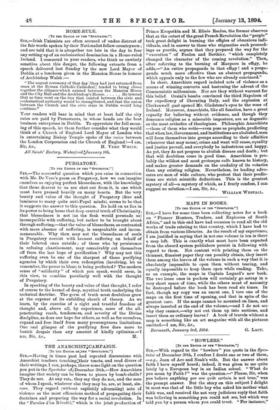THE ANARCHISTiCAMPAIGN.
[To THE EDITOR OF:THE "SPECTATOR.") Sin,—Having in times past had repeated discussions with Anarchist teachers touching:their tenets, and read divers of their writings, I can, perhaps, throw some light on the question you put in the Spectator off December 30th,—How Anarchists imagine that society can be blown to pieces by bomb-shells ? They do not. At any rat, they say they do not, and the men of whom I speak, whatever else they may be, are, at least, sin- cere. They regard (without explicitly advocating) acts of violence as the most efficacious method of propagating their doctrines and preparing the way for a social revolution. In the "Paroles d'un Revolte," which is the joint production of Prince Kropotkin and M. Eliseo Reclus, the former observes, that at the outset of the great French Revolution the "people' took great delight in burning the effigies of obnoxious indi- viduals, and in answer to those who stigmatise such proceed- ings as puerile, argues that they prepared the way for the- " execution " of Foulon and Berthier, "which completely changed the character of the coining revolution." Then,. after referring to the burning of Maupeou in effigy, he adds,—" An entire propaganda in that effigy ! and a propa- ganda much more effective than an abstract propaganda,. which appeals only to the few who are already convinced."
In short, Anarchists regard isolated acts of violence as a- means of winning converts and hastening the advent of the Communistic millennium. Nor are they without warrant for this belief. Orsini's bombs convinced the third Napoleon of the expediency of liberating Italy, and the explosion at Clerkenwell gaol opened Mr. Gladstone's eyes to the woes of Ireland. Moreover, Anarchists, like all fanatics, have a great capacity for believing without evidence, and though they' denounce religion as a miserable imposture, are as dogmatic. as the most orthodox of theologians. Philosophic Anarchists —those of them who write—even pose as prophets, predicting that when law, Government, and institutions are abolished, men will form themselves into groups according to their affinities. (whatever that may mean), crime and want will cease, equality and justice prevail, and everybody be industrious and happy._ As yet, they do not propose to abolish disease and death; but that will doubtless come in good time. Anarchism is pro- bably the wildest and most grotesque cults known to history,. and makes greater demands on the credulity of its votaries than any existing religion. Nevertheless, its leading advo- cates are men of wide culture, who protest that their predic- tions are strict scientific deductions. This is the greatest. mystery of all—a mystery of which, as I freely confess, I can suggest no solution.—I am, Sir, &c.,
WILLIAM WESTALL..






































 Previous page
Previous page